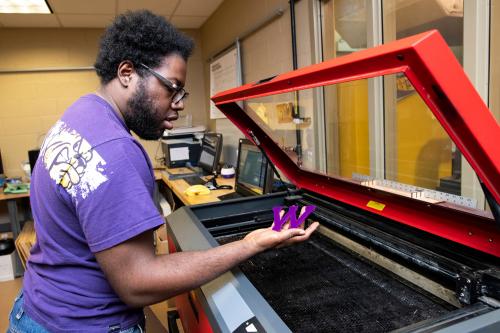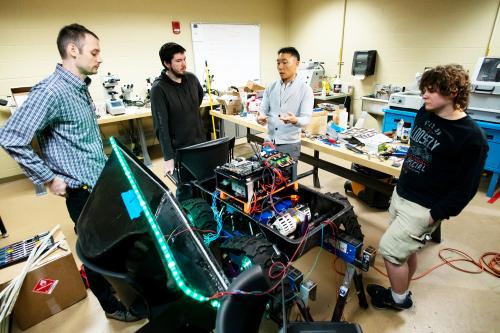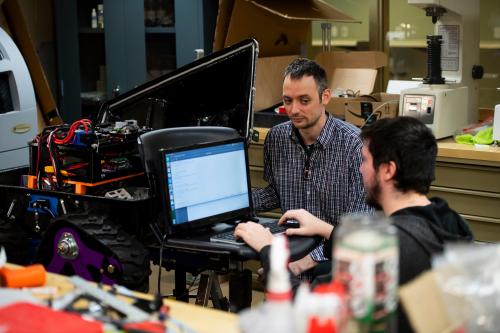University News
WIU-QC 10th Anniversary: The School of Engineering
May 18, 2022
Editor's Note: This is the second in a series of stories about the celebration of the 10th anniversary of WIU's Riverfront Campus. We will be highlighting other historical aspects, as well as students and alumni from the Quad Cities' programming.
MACOMB, IL -- In 2009, when the Western Illinois University School of Engineering was created, the Quad Cities was the largest metropolitan area in the country without an Engineering program. A clear need was felt, so the campus delivered.
The campus started by offering a General Engineering program, which was heavily focused on the mechanical side of the field, but now offers a broader General Engineering program, as well as programs specializing in Mechanical Engineering, Civil Engineering and Electrical Engineering.
The campus offers a variety of labs, including the Electronic/Mechatronics Lab, 3D Printing Lab, Fluid Dynamics Lab, Maker Space Lab, Prototype Lab and Materials Lab. Each lab provides students with unique opportunities to study different fields of engineering, as well as see firsthand the various scientific phenomena they are learning about.
"I have been able to see students use all of our labs, but a project that particularly stands out to me is a student who utilized the Maker Space to build a motorized Star Wars AT Walker robot" said Professor of Engineering Blair McDonald. "Regardless of the project or vision someone has, this lab allows students to bring ideas to life."
In addition to the labs on campus, WIU is also associated with the Quad Cities Manufacturing Lab, which supports the manufacturing industry in the Quad Cities. The Manufacturing Lab provides a research venue for innovative projects to be tested, altered and perfected, prior to being incorporated in a commercial manufacturing process. This lab is constantly searching for new problems to solve.
"The Manufacturing Lab is a research center of excellence that serves as a place to try new things and test out ideas," said McDonald "They do work for the government and military, as well as private commercial contracts."
While each of the engineering programs requires an internship for completion of graduation requirements, most students are self-motivated and go above and beyond the requirement. They work for local industries during their years as a student, and oftentimes are hired by those employers after graduation. Most of Western's Engineering graduates stay in the local area due to the abundance of employment opportunities in the region. They help grow and support the Quad Cities economy and community.
Regardless of if they utilize the internship program to gain their first workplace experience, or if they have been working at these companies throughout their years as a student, students in the School of Engineering and Technology leave prepared to be successful in their careers.
"I am a believer in students graduating with work experience and I know our graduates are prepared for successful careers in the field," said McDonald. "The WIU engineering programs here in the Quad Cities is the region's best-kept secret and I hope it continues to grow and produce great graduates."
WIU School of Engineering and Technology Director Rafael Obregon said he enjoys telling prospective students and their parents that WIU will instill in its students the vision of making dreams come true.
"Engineering and Technology share one essential concept: innovation," said Obregon. "Engineering entails translating ideas into concrete concepts. Technology-related areas focus on transforming those ideas into reality. The combination results in moving from concept to completion, making dreams come true."
For more information about the WIU School of Engineering and Technology, visit wiu.edu/cbt.
Posted By: Rachel Greene (WIUnews@wiu.edu)
Office of University Communications & Marketing




Connect with us: